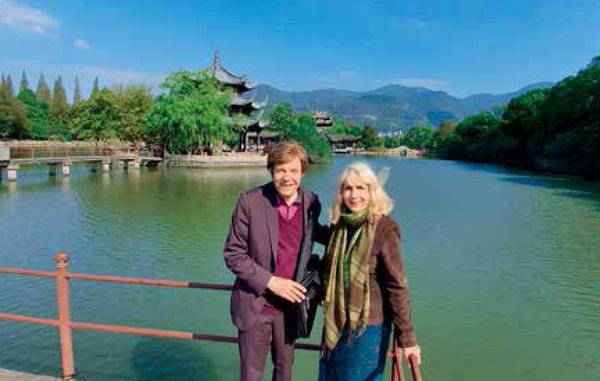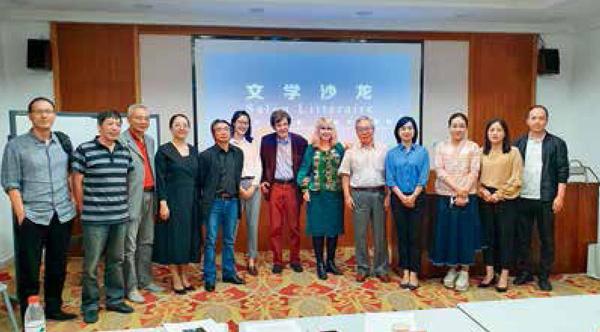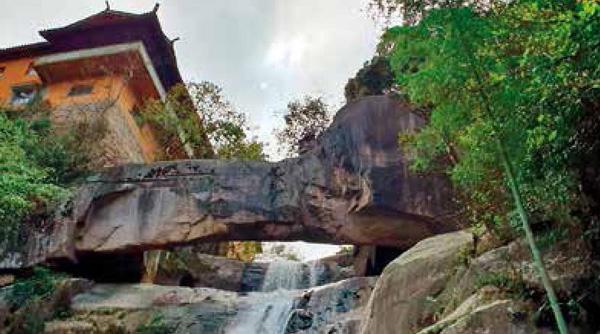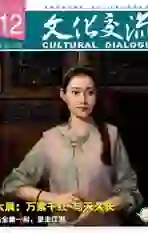带回法国的,是微笑
2019-01-09丹妮尔·拉斯特阿诺德·拉斯特
丹妮尔·拉斯特 阿诺德·拉斯特



金秋时节,首届浙江省国际友城媒体合作传播论坛活动在杭州举行,来自亚洲、欧洲、美洲、非洲等67个国家的近120位媒体代表走访了浙江多地,亲身感受浙江的人文风情和城市发展。活动结束后,我们向一些媒体代表发出邀约,请他们来说说自己眼中的浙江。这些文章将陆续在本刊发表。
我们重回中国了。19年前我们曾访问北京,游览紫禁城、长城,还有其他风景名胜。这一次,我们来浙江,参加国际友城媒体合作传播论坛,和来自67个国家的代表一起通过采风了解浙江。
我们很自豪,此行是代表法国雨果之友学会。我们这个学会推崇并推广在中国读者中享有盛誉的法国作家维克多·雨果的作品和思想。
能见到生活在万里之外的人,并与他们探讨文化和交流人生见闻,不亦悦乎!
(一)
抵达杭州后的第一天,我们遇见一位中国教师。他对雨果作品极有兴趣,很想了解中国道教是否对雨果有过影响,法国研究者是否有兴趣对这个课题展开研究。就像16世纪法国著名散文家蒙田一样,这位教师很愿意与其他人交流思想。而此行我们遇见的人里,很多人有类似的愿望。我们发现,他们愿意将自己国家的文化、艺术、文学与他人分享,也愿意了解其他国家的作家和艺术家的作品及其及思想。
我们采风团一行人来到宁波慈溪市傅家路村,遇见了一位年轻人向我们介绍中国青瓷。元代青瓷是他目前的研究课题,他研究的内容之一是青瓷的外文名字celadon的由来。
我们向他介绍说,17世纪法国作家于尔菲撰写的一部浪漫小说《阿斯特蕾》中,男主角牧羊人叫做雪拉东(Celadon)。该小说出版于1610年,当时来自龙泉的中国青瓷很受法国人喜爱。青瓷的颜色与牧羊人戴着的浅绿色的丝带相近,所以用celadon称呼来自中国的青瓷。再后来,青瓷的法国名字celadon不胫而走,出现在其他国家语言中。对于我们的解释,他看起来很满意。
可以说,这是文化交流的一个完美案例。我们后来才发现,我们抵达村庄时收到的礼品袋中就有一件瓷器。馈赠礼品是中国人的传统,以表达好客和热情。
我们在台州受到作家协会的热烈欢迎,台州市图书馆墙上高挂蓝色横幅,上书“热烈欢迎法国雨果文学会贵宾访问台州”。整个交流活动气氛非常友好,富有成果。我们与作家们交谈了一个小时,其中不少人在中国享有盛名。他们向我们介绍了自己已发表的作品,并很愉快地向我们细述他们欣赏的法国作家。果不其然,雨果是第一个被提到的,另外还有加缪、普鲁斯特、普雷维尔和尤瑟纳尔等蜚声世界的法国作家。他们对法国文学的熟知让我们印象深刻。他们很善解人意,提出将他们的出版作品邮寄到法国给我们,这样我们的行李就不会超重。我们将雨果之友学会出版的两册雨果杂志回赠给台州图书馆。这次交流让我们在离开时满怀欣喜。
(二)
中国的确是一个充满各种鲜明对比的国度。城市中高楼林立,有些建筑风格很有创新性。
我们到杭州后第一天访问的浙江广电集团新大楼,拥有最为先进的数字技术设备,我们仿佛进入科幻电影中。长达38公里的杭州湾跨海大桥看起来也同样很现代化,很让我们惊奇。这条金属巨龙仿佛自海中腾起,变天堑为通途,气宇非凡。
在杭州的最后一晚,我们观看《印象西湖》演出。布景梦幻,色彩灿烂,既有传统的中国歌曲、脍炙人口的音乐旋律以及戏曲唱段,又有柴可夫斯基的《天鹅湖》片段以及贝多芬第九交响乐《欢乐颂》。舞蹈节目中,主角倩影倒映在湖面,仿佛电影特效。舞者们时隐时现,时聚时散,配合天衣无缝,犹如童话一般。这场演出的艺术指导是张艺谋,即电影杰作《大红灯笼高高挂》的导演。演出展现的种种优美意境,让我们心悦诚服。场面宏大壮美,华服充满诗意,有一种让观者叹为观止的神力。
中国不仅是一个现代化国家,还是一个有悠久历史的国家。此次采风行活动中,我们常有乘坐时光机器的穿越感。在浙北的乌镇,我们“穿越”到了唐朝末年。乌镇完全建在水上,真乃“中国的威尼斯”。我们先是乘舟游览,然后弃舟上岸,在小街小巷穿行。古老的木结构房屋有雕花门窗,整个小镇完好地保存了昔时容貌。更让我们有穿越感的是寺庙,例如天台山国清寺。国清寺建于598年,栖身群山之中,虽然光阴荏苒,却容顏未变。寺内塔群耸峙,林立的佛像面貌各异,有开怀大笑者,有肃穆庄严者,有青春年少者,有耄耋老者。
我们还观赏了石梁瀑布,水流自天然石梁直下几十米,很是壮观。不远处有一小寺院,仿佛正在边上俯瞰水流如何从天而落。从寺院到石梁瀑布并不远,沿一条小径稍走片刻,便进入树林深处。
(三)
在台州学院临海校区举办的雨果讲座,让我们遇见更多人。一位教师赠送给我们两册他出版的关于自由体诗的新书,并征询是否有幸能得到我们的出版作品。阿诺德写过很多书,其中多数是大部头,但我们此次中国行特意轻装而来,并未携带厚厚的书。因此,我们回赠他一本丹妮尔撰写的《雨果:有独特想法的人》,我们两人都在书上签了名。
大学同学们的专注也让我们印象深刻。讲座行将结束,我们问是否还有问题交流。同学们踊跃提问,其中一人问:雨果《悲惨世界》中的人物冉·阿让和沙威最后会不会化敌为友。我们说不会,并给出了解释。
感觉他们还有很多问题要问,但我们因行程匆匆,只得离开。与他们交流的时间虽然短暂,但很开心。
第二天我们打道回国。中国的现代化程度让人惊讶,但我们也见识到了中国的另一面——古老的故事、传说和悠久的历史。中国渴望文化交流,认同雨果关于各国人民和文化和谐的梦想,这让我们感动。
我们结交的中国朋友们笑容满面,这让我们想起奥地利作曲家弗朗兹·莱哈尔的歌剧作品《微笑的国家》。我们带回家的,正是这样的微笑。
(本文图片提供:拉斯特夫妇)
Here we are again in China. We had visited Beijing and its Forbidden City, the Great Wall, and many other wonders 19 years ago. This time, we have come to discover Zhejiang province at an international forum that brings together representatives from 67 countries. We are proud to represent France with the Society of Friends of Victor Hugo, an association that promotes the work and thought of a writer who is highly regarded by the Chinese.
What a joy to be in contact with people who live thousands of kilometers away and to have cultural and personal exchanges with them! On the first day, in Hangzhou, we meet a Chinese teacher. He would like to know if it is possible to establish links between Victor Hugo and Taoism, and if French researchers would be open to looking into this subject. Hugo's work is of great interest to him. Like Montaigne, one of our great 16th-century writers, he is eager to "rub and grind his brain against those of others". This desire is something we feel burning in many of those we meet. We find in them the need to share their culture, their art, their literature, but also to discover writers and artists from other countries, their approaches and their ideas. When our delegation goes across the village of Cixi - one of our many visits, a young man comes to meet us. He too seems to feel the need to enrich his knowledge with ours. He tells us about a famous Chinese ceramic, celadon, green or translucent blue-grey. We understand that he is doing research on this ceramic invented in the Yue region (Siang basin). He's searching for the origin of the word. We teach him, to his great satisfaction, that the celadons owe their name to a character in by Honoréd'Urfé (1567-1625), a shepherd called Celadon, who wears green ribbons. The novel was written in 1610, when the products of Longquan's Chinese workshops were very popular in France. The colors of Chinese porcelain were then compared to Celadon ribbons. This celadon name for porcelain has been adopted in other languages. This is a great example of the cultural exchange that our Chinese friends are so fond of. We later find that in the bag given to us when we arrived in the village there is a box containing one of these precious ceramics. To offer gifts is also a tradition among the Chinese so that they are able to show their hospitality and their desire to please.
Another very friendly and fruitful exchange was also held with an association of writers from Taizhou who welcomed us to the city library, with a large blue banner stretched out across a wall: "Welcome to the distinguished guests of the Society of Friends of Victor Hugo". We talked for an hour with these writers, most of whom are well known in China. They explained to us what theyve been publishing and were very happy to talk to us about French authors they appreciate: Victor Hugo, of course, but also Albert Camus, Marcel Proust, Jacques Prévert, and Marguerite Yourcenar. We were impressed by their extensive knowledge of our literature. So as not to overburden our baggage, they were kind enough to send these publications to us by post. For our part, we gave the library two copies of our magazine, . This warm exchange made us happy as we left.
China really is the country of contrasts. The cities we cross seem like forests of skyscrapers, with often inventive architecture. The radio and television station in Hangzhou City, which we were shown on the first day, is equipped with all the latest digital techniques and we were impressed by the equipment and facilities, much of which seemed to come out of a science-fiction film. The same amazing modernity could be seen with the 38-km bridge that crosses the bay of Hangzhou. This large metal snake, which looks like it has emerged from the sea, allows something extraordinary to happen: its crossing links two distant shores in record time.
For our last evening in Hangzhou, we were offered a show on the West Lake. Dreamlike settings with sparkling colors, traditional Chinese songs, popular melodies or operatic arias that alternate with an extract from Tchaikovsky's and last movement of Beethoven's 9th Symphony with the Ode to Joy, virtuoso dancers whose prowess is reflected on the water, special effects that give the impression that certain characters appear or disappear magically – all happily blend together and follow on from one other in a harmonious and fairytale ensemble. The artistic director, Zhang Yimou, is the director of a masterpiece of cinema: . We find in this show everything that seduced us in this work: a great formal beauty, sumptuous poetic costumes, and a magical power to fascinate.
China is not only a modern country; it is also a country of history. At times we have the impression of having borrowed the time machine of the English author H.G. Wells. In the small town of Wuzhen, in the north of Zhejiang province, we are transported to the end of the Tang dynasty. Entirely built on the banks of the canals, this city is a Chinese Venice. We started the tour by boat and then walked through the narrow streets, where crafts predominate, especially silk painting. The 9th-century houses are made of wood, with artistically carved doors and windows, and the whole city has been preserved and maintained as it was. Even more radically out of time are the ancient temples, such as Guoqing Temple, located in the Tiantai district. Perched in the mountains and built in 598, it seems to have escaped the passing of each century, with its pagodas rising in a large garden and its rows of Buddhas, all with different faces: from the laughing to the most serious, from the youngest to the oldest.
We were also able to discover a natural landscape that was entirely protected: the Shiliang waterfall. This waterfall, which falls from a height of several tens of meters, flows under a natural arch, next to a small temple that seems to contemplate its movements. Its access only required a short walk and we found ourselves in the heart of a forest, facing one of its secret beauties.
A lecture on Hugo on the Linhai campus, part of Taizhou University, allowed us to meet other people. A teacher offered each of us a book that he has just published on free verse. He was keen to receive publications from us. To spare our arms and suitcases, Arnaud did not bring any of his books, most of which are quite heavy. We offered him a short biography of Hugo by Danièle: , published by Portaparole, which we both signed for him.
The students' engagement was impressive. At the end of our conference, we asked if they had any questions. They came quick and fast. One of the students wanted to know if Jean Valjean and Javert (characters in ) couldnt, in the end, join forces. We answered no. Javert stands for order, law, and respect for rules in a very rigid way. Jean Valjean, convicted of stealing a loaf of bread and sentenced to the galleys, has a very different outlook. He knows that one must take into account what makes a human being, what he has experienced, and the circumstances in which he acts. When Javert discovers the generosity of Jean Valjean, a former convict, he cannot bear to live any longer, realizing that all his certainties are crumbling. A student was, for her part, very surprised by what we told about a poem entitled : Hugo asks us to forgive the wicked, even the tyrants. We explained that when someone who has misbehaved is in the position of a victim, Hugo defends him, no matter what he has done. We felt that these students would have liked to ask other questions, but our schedule was busy. We therefore had to leave, but happy to have been able to share some time with these young people.
The next day we returned to our country. China has surprised us with its modernity, but we have also met a China full of old tales, legends and History. The Chinese moved us with their thirst for interaction and seemed to us to share with Victor Hugo the dream of harmony between peoples and cultures. We found many of our Chinese friends smiling, and we have very often been received by them with the kind smile that inspired the Austrian composer Franz Lehar's operetta . As we left, we took that smile home with us.
We thank Bradley Stephens for his corrections of the English text.
